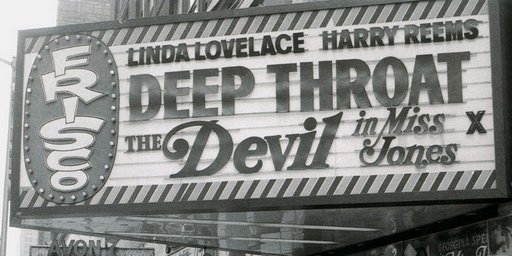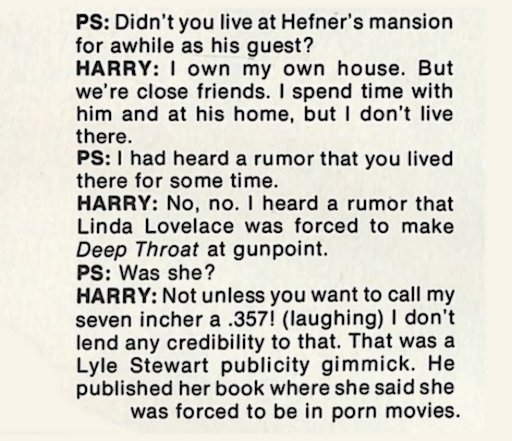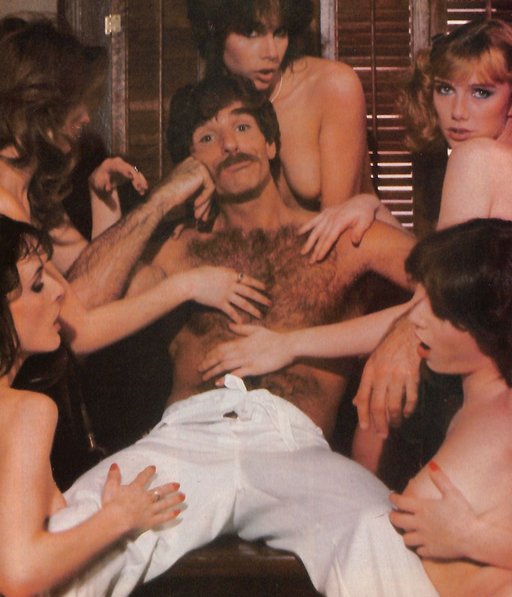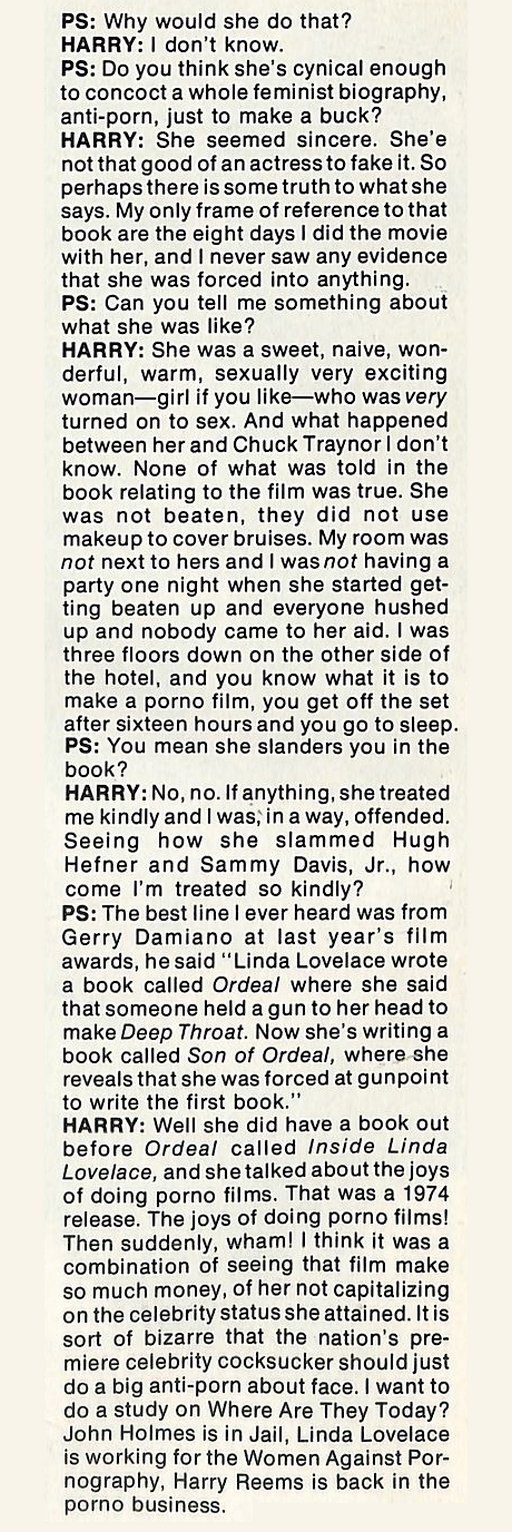Saturday, October 12th, 2019 -- by Bacchus

I have been aware of Lorelei Lee’s work in pornography for a very long time; her first appearance on ErosBlog was in 2010 but I considered her a long-established star even then. Then, now, and since ErosBlog was brand new, I have been aware that the experience of making porn is complicated, in the precisely the same way that sex work generally is complicated. Women who speak about these experiences during their careers are typically very upbeat, adopting the voice of what Lorelei calls “the unashamed, empowered whore.” After retirement, the narratives grow more complex. Maybe sex work wasn’t the best job ever; maybe it had bad days and worse employers. We often seem to hear more about the downsides of sex work, typically, from former sex workers than from current ones. Here’s a small excerpt from a long article by Lorelei Lee, explaining part of why that may be so:
Even in those early years I knew the work was not how anti-sex-work feminists described it. I knew it was as good and as terrible as other, lower-wage work I’d done. I knew, too, how quickly people stopped listening when they began to feel pity. So I pretended. I pretended all of it was a kind of adventure. That what I gained from it was more than rent. I dismissed how much that rent meant to me. I pretended that I was not so poor, that I had not grown up poor. That I had not cried out of fear of not knowing where the money would come from next. That I did not steal food from every restaurant I ever worked in. That I never ate the food people left on their plates. That I did not watch movies about “college kids” with a gripping, painful yearning in every part of my body. That I did not come home from every sex-work job giddy at the possibility of ordering more takeout Chinese food than I could eat, giddy at having enough money to commit the thrill of waste.
But I also knew that the idea that I was “empowered” by trading sex was a lie. In the early 2000s, as some sex workers were organizing and holding public events in San Francisco, calling on queers and whores to unlearn our shame–intimating that it was our responsibility to the movements to unlearn our shame–I struggled with mine. There were days when men paid me less than they’d promised and I took it and said nothing. There were days when men wheedled me into something extra that I’d have charged more for if I’d been better at negotiating. There were days when men intentionally crossed every boundary I’d tried to set, and I felt ashamed that I had not stopped them. I felt shame when I didn’t want to go to a job I’d booked, when, instead of going to work, I sat down on the floor of my apartment and watched the phone ring. I admired the women I saw speaking in public, admired what looked to me like their power. I tried to mimic them, and there were moments when I thought I could. But more often, the ideal of the unashamed, empowered whore–the sex worker of the liberal imagination–was discouragingly unreachable to me.
Long ago I made a choice, editorially, for ErosBlog. This publication supports and reinforces where possible the upbeat narratives of active sex workers — the ones who represent as “unashamed, empowered whores.” My reasoning is simple. Everybody has an equal ability to reflect and understand that upbeat sex work narratives may omit nuance and complexity. But for a random dude like me to point fingers and undermine those narratives? Not a good look. For sex workers to be heard, listened to, and believed about their experiences, they need their voices reinforced, not undermined by skepticism and “well, actually” second-guessing. Here’s more from Lorelei Lee about the difficulty of being heard:
Neither liberal feminists nor libertarians, radical feminists nor the religious right, can hear us speak in our own words. They do not want to hear us; they want to collect the scraped-bare “facts” of our lives and call them data. They want to interrogate us. Who did you work for? How young were you? Do you have papers? Do you have children? Do you have parents? Have you been to school? Do you speak English? What are your traumas? Who hurt you? Do you love it? Do you really love it? How much do you love it? During a recent visit I made to a law school class, a student asked me, “Is there a level of poverty at which a woman can’t consent?”
Again and again in my own life, people have demanded to know what has been done to me, how I was exploited, what kind of trauma or poverty pushed me into believing I had no other options than to trade sex. Or they have asked to hear about how trading sex has been my pathway to empowerment, to sexual adventure. They have asked me to slot my experiences neatly into one story line or another, or demanded I hand over the facts of my life so they could do it for me.
In 2014, when the California State assemblyman Isadore Hall authored a bill to mandate the use of condoms as well as state-recorded testing of performers in adult films, my coworkers and I took buses and trains up to the state capitol to testify against the bill. The elaborate, community-driven testing regimen we relied on had prevented even a single on-set transmission of HIV since 2004, and it would be seriously undermined by the proposed legislation. Perhaps worse, Hall’s bill would have created a state registry of performers’ legal names and health information. We gathered the signatures of more than six hundred performers, a thick ream of paper that I carried clutched to my chest, shielding my body from the Senate Appropriations Committee with this physical evidence of our collective will. I remember Hall testifying to the committee that he had written this bill because someone needed to be “a voice for the voiceless,” and that person would be him. I sat beside him at a podium microphone. My coworkers stood in a long line at a microphone behind him, waiting for him to stop so we could speak.
That’s it, then. Even if I suspect that a particular narrative is shining us on, a bit, about the wonderful life of an empowered sex worker, who am I to crap on it? What right do I have to become part of the problem these women face in being heard, by second-guessing their narratives?
I have actually been wrestling with this problem for as long as ErosBlog has existed. I am not going to post any links or citations to the “facts” I’m about to recount; this is a summary of what needs to some day be a blog post, where I will post receipts, if I ever manage to assemble them all. This story involves Linda Lovelace, famous to oldsters like me for her uninhibited performance in the now-vintage porn movie Deep Throat. At some point after she had long been retired from the business, she partnered up with anti-porn activists and a book was released in her name detailing her negative experiences during her porn career. Without going into too much detail, I just want to say that it’s a struggle to reconcile her post-porn account of her coercive experiences with the scenes actually visible on 16mm film. Some of her contemporaries from the production, interviewed about her modern account of negative experiences, seem to struggle likewise. But again, who am I to call her account into question? That’s why my post about Linda Lovelace is the blog post that’s gone unwritten longer (by at least a decade) than any other partially-formed posting notion that’s ever passed through my head.
This Gordian knot I haven’t yet managed to cut turns out to be even more complicated than I’ve presented it, and here’s why: I’m not young. I’m not old enough to have seen Deep Throat in a movie theater, but I’m old enough to have stumbled over a 1970s dirty book on a paperback swap rack. That book, too, had Linda Lovelace’s name on it. And that narrative was upbeat and empowered. The positive tone of the narrative voice in that book matched Linda’s performative presentation in her movies.
Who am I to call her account into question? You can’t ask that question without also asking: which account? They can’t both be true!
My editorial policy is to preferencing the upbeat accounts of sex workers over all the negative bullshit that seeks to deny them their voices. But this article I’m quoting today by Lorelei Lee makes it perfectly clear (especially if you read the whole thing, which you should) that the upbeat accounts are unlikely to be the whole story. For reasons. Good reasons. It is, indeed, complicated.
I’m just some fuckin’ dude. It’s not for me to say how anything is for sex workers. I don’t have a problem, and I do have a history, of supporting hard-working women and reinforcing their voices by promoting their upbeat narratives. Even though I know it’s complicated. I’m nonetheless really glad to have this piece by Lorelei Lee that expounds at such thoughtful length on the nature of those complications. It’s even possible that, maybe, with this article to cite and to use as a conceptual framework, I’ll finally be able to engage with Linda Lovelace’s two radically different narratives, and how we should think of them, and how we should think about the ways that they do or don’t seem to match the famous performance that made her a legendary star.
Similar Sex Blogging:











